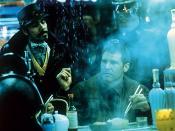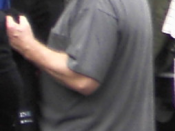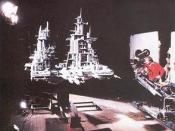1080 words
HSC English Advanced
Module A: Comparative Study of Texts and Contexts Elective 2: In the wild.
Talk-Back Radio Script
Richard Glover: Good morning listener, welcome to this mornings program. I am excited to introduce to you this morning guest, Mr. Ridley Scott. He will, of course, be best known to most as the director of the controversial 1992 film 'Blade Runner' Welcome to our program Ridley.
Ridley Scott: Thank you Richard. This is my first trip to Sydney and I have certainly been enjoying this beautiful city.
Richard Glover: Right, let's get straight into our subject matter. 'Blade Runner' is one of those films which not only reflect the concerns of its time, but, according to one critic, "its message seems to be a future warning of doom and gloom". How would you respond to this?
Ridley Scott: I don't believe that the film does predict as you say, "doom and gloom", certainly my intention was to present a futuristic vision of earth as a dystopic society dominated by science and technology.
My purpose was to warn of the dangers in disregarding the natural order and its rhythms and of the unattainability of a utopia.
Richard Glover: Would it be fair to say that your context at the time has played a role in your interpretation of the situation depicted in the film?
Ridley Scott: Certainly. I directed 'Blade Runner' in 1982. This was a time characterized by rampant capitalism and over-population. Don't forget, this was also the time of the Cold War, when Ronald Regan's Star Wars program was very much the flavour of the time. There was rapid development in the sciences and a move towards genetic engineering. Besides these, I feel that my film reflects the world's attitude...


